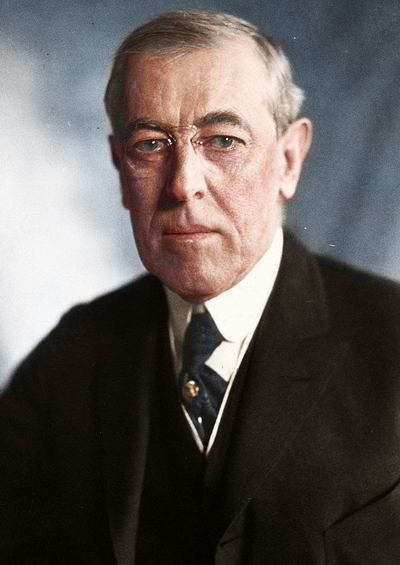Annals of War: How Woodrow Wilson Cost Europe a Century — Part I
Did American intervention in WWI help destabilize the European continent?
February 12, 2015

When Woodrow Wilson plunged the United States of America into Europe’s carnage in 1917, he shed a century-long Republican tradition of anti-militarism and non-intervention in the quarrels of the Old World.
Needless to say, there was absolutely nothing noble that came of Wilson’s intervention. It led to a peace of vengeful victors, triumphant nationalists and avaricious imperialists — when the war would have otherwise ended in a bedraggled peace of mutually exhausted bankrupts and discredited war parties on both sides.
By so altering the course of history, Wilson’s war bankrupted Europe and midwifed 20th century totalitarianism in Russia and Germany.
These developments, in turn, eventually led to the Great Depression, World War II, the Holocaust, the Cold War and the permanent U.S. Warfare State and its military-industrial complex.
Reimagining the past
Almost an entire century onward, let us imagine that the war ended in 1917 by a mutual withdrawal from the utterly stalemated trenches of the Western Front, as it was destined to.
There would have been no disastrous summer offensive by the Kerensky government, or subsequent massive mutiny in Petrograd that enabled Lenin’s flukish seizure of power in November 1917.
The 20th century would not have been saddled with a Stalinist nightmare or with a Soviet state that poisoned the peace of nations for 75 years, while the nuclear sword of Damocles hung over the planet.
Likewise, there would have been no abomination known as the Versailles peace treaty. No “stab in the back” legends destabilizing Germany, owing to the Weimar government’s forced signing of the “war guilt” clause.
No continuance of England’s brutal post-armistice blockade that delivered Germany’s women and children into starvation and death and left a demobilized three-million man army destitute, bitter and on a permanent political rampage of vengeance.
A more peaceful future
So too, there would have been no acquiescence in the dismemberment of Germany and the spreading of its parts and pieces to Poland, Czechoslovakia, Denmark, France, Austria and Italy — with the consequent revanchist agitation that nourished the Nazis with patriotic public support in the rump of the fatherland.
Nor would there have been the French occupation of the Ruhr and the war reparations crisis that led to the destruction of the German middle class in the 1923 hyperinflation. And finally, the history books would have never recorded the Hitlerian ascent to power and all the evils that flowed thereupon.
Instead, the war of victors made possible by Woodrow Wilson destroyed the liberal international economic order — relatively free trade, rising international capital flows and rapidly growing global economic integration — which had blossomed during the 40-year span between 1870 and 1914.
That golden age had brought rising living standards, stable prices, massive capital investment, prolific technological progress and pacific relations among the major nations — a condition that was never equaled, either before or since.
Alternative history aside, let us also keep a few important facts about WWI straight:
Proposition #1: Plenty of Blame to Go Around
The Great War was about nothing worth dying for and engaged no recognizable principle of human betterment. There were many blackish hats, but no white ones. It was an avoidable calamity issuing from a cacophony of political incompetence, cowardice, avarice and tomfoolery.
Sure, we can always blame the bombastic and impetuous Kaiser Wilhelm for setting the stage with his foolish dismissal of Bismarck in 1890, his failure to renew the Russian reinsurance treaty shortly thereafter and his quixotic build-up of the German Navy after the turn of the century.
But then we must also blame the French for lashing themselves to a war declaration that could be triggered by the intrigues of a decadent court in St. Petersburg – a court where the Czar still claimed divine rights and the Czarina ruled behind the scenes on the hideous advice of Rasputin.
Likewise, we must blame Russia’s then-foreign minister Sazonov for his delusions of greater Slavic grandeur that had encouraged Serbia’s provocations after Sarajevo.
And we must blame the doddering emperor Franz Joseph for hanging onto power into his 67th year on the throne and thereby leaving his crumbling empire vulnerable to the suicidal impulses of his generals.
Blame also goes to the duplicitous German Chancellor, Bethmann-Hollweg, for allowing the Austrians to believe that the Kaiser endorsed their declaration of war on Serbia.
And blame goes to Winston Churchill and London’s war party for failing to recognize that the Schlieffen Plan’s invasion through Belgium was no threat to England, but an unavoidable German defense against a two-front war.
And let us not talk about such noble war goals as the defense of democracy, the vindication of liberalism or the thwarting of Prussian autocracy and militarism.
In London, Churchill and Kitchener were all about the glory of empire, not the vindication of democracy.
In any event, German autocracy was already on its last leg. And the Austro-Hungarian, Balkan and Ottoman mix of nationalities would have erupted in interminable regional conflicts anyway, regardless of who won the Great War.
In short, nothing of principle or higher morality was at stake in the outcome.
Proposition # 2: What U.S. interest?
The war posed no national security threat whatsoever to the United States. Presumably, of course, the danger was not the Entente powers — but Germany and its allies.
But how so? After the Schlieffen Plan offensive failed on September 11, 1914, the German Army became incarcerated in a bloody, bankrupting, two-front land war that ensured its inexorable demise.
Likewise, after the battle of Jutland in May 1916, the great German surface fleet was bottled up in its homeports — an inert flotilla of steel that posed no threat to the U.S. coast 4,000 miles away.
As for the rest of the central powers, the Ottoman and Hapsburg empires already had an appointment with the dustbin of history.
Takeaways
Woodrow Wilson shed a century-long Republican tradition of anti-militarism and non-intervention in the Old World.
There was absolutely nothing noble that came of Wilson’s intervention in WWI.
Wilson’s war bankrupted Europe and midwifed 20th century totalitarianism in Russia and Germany.
The war of victors made possible by Woodrow Wilson destroyed the liberal international economic order.
The Great War was about nothing worth dying for and engaged no recognizable principle of human betterment.
In London, Churchill was all about the glory of empire, not the vindication of democracy.

